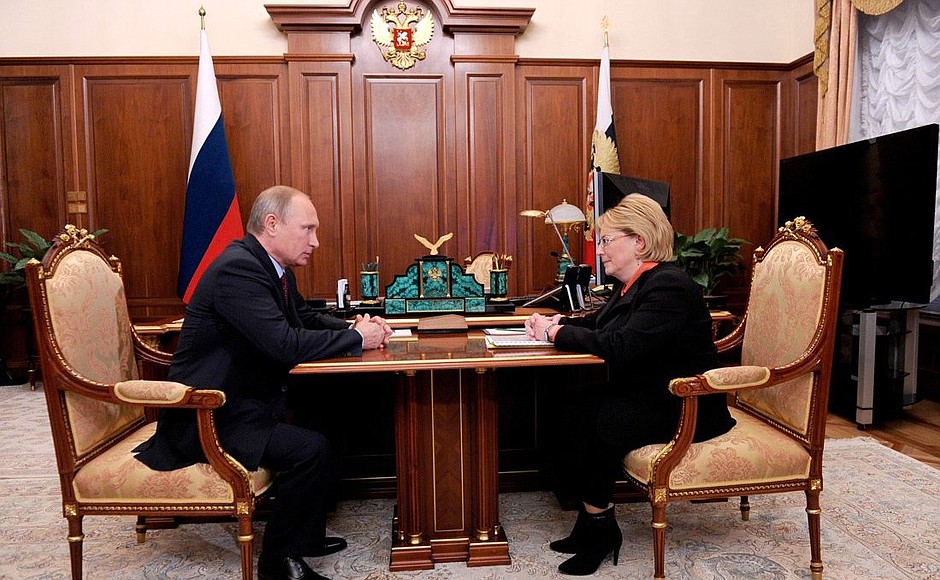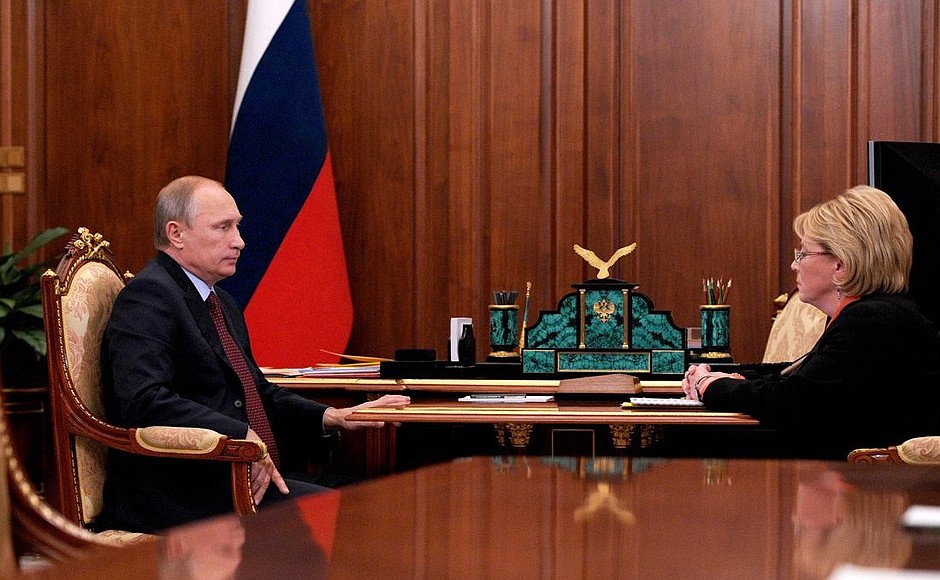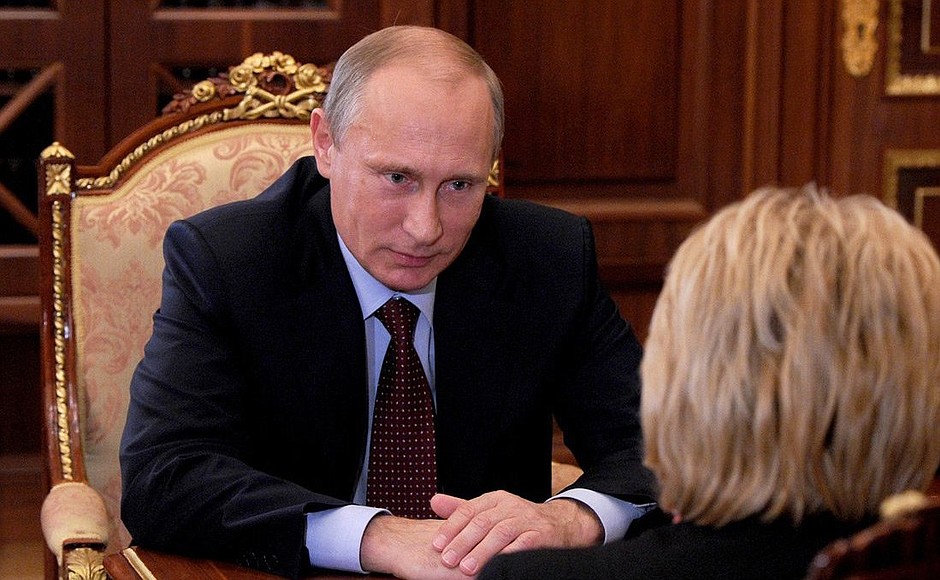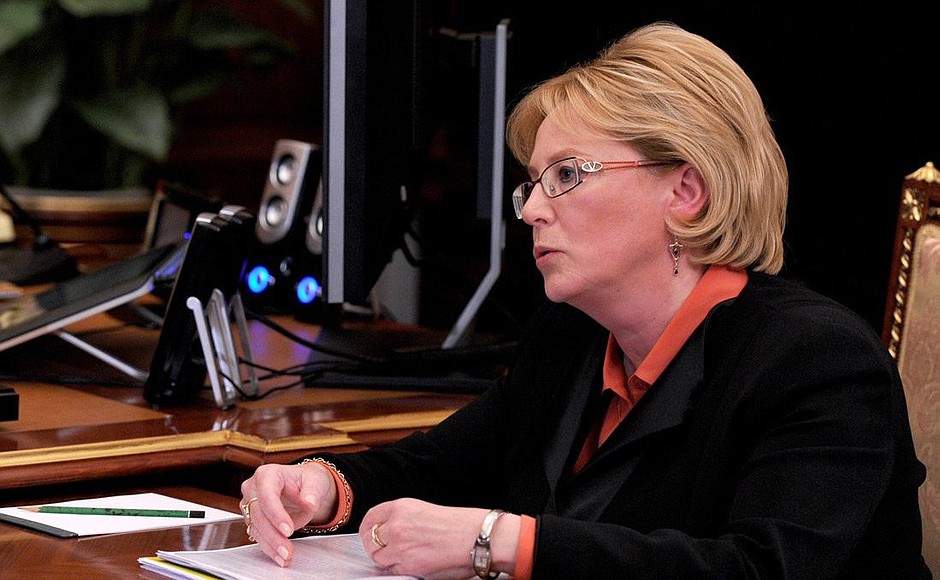President of Russia Vladimir Putin: Ms Skvortsova, since we are in the middle of the budget approval process, my first question is about financing for the healthcare sector over the coming period – 2015 and the subsequent period. Please, go ahead.
Healthcare Minister Veronika Skvortsova: Mr President, the 2015 budget is fully balanced and the 2016 budget is nearly entirely balanced too. We are increasing funding for the programme guaranteeing free state medical provision by more than 306 billion rubles [around $7.5 billion], which represents an increase of 18 percent. Per capita healthcare financing is increasing by 15.4 percent, and the compulsory medical insurance basic programme will increase by more than 18 percent.
We thus have the resources needed to carry out the tasks the state healthcare development programme sets and implement the instructions on increasing the amount of high-tech medical assistance provided. We have already increased by 32,000 people the number of people receiving high-tech medical assistance compared to last year’s figures. Next year, we will reach a figure of 650,000 people. Last year, the figure was only 506,000 people. In 2016, as you instructed, we will reach a figure of 750,000 people, which represents a 1.5-fold increase from what we had in 2013.
We also have the resources needed to fulfil the instructions on raising healthcare sector wages. The results for the first half of 2014 showed that doctors’ average wages now come to around 143 percent of the average wage in the economy as a whole, and the average wage of other healthcare sector workers now comes to around 83 percent of the average wage in the economy overall.
(Ms Skvortsova went on to explain the principles behind wage standardisation for people in similar positions, and standardisation of medical service costs in different regions within the compulsory medical insurance programme. The Minister also spoke about measures taken to improve healthcare sector management in the regions and changes in purchasing policy, especially with regard to medicines and reagents for laboratory tests. This will make the healthcare system more efficient and free up funds that can be spent instead on developing technology, increasing wages, and other needs in the sector).
Vladimir Putin: Good. My second question is a traditional one, but nonetheless one of the key issues – demography.
Veronika Skvortsova: The good news, Mr President, is that we are seeing steady progress. We examined the figures for the last 8 months together with Rosstat [Federal State Statistics Service]. They show that we have 14,000 more births than for the same period last year, and 11,000 fewer deaths than for this period last year. We have achieved population growth of 19,000 people, whereas for the same period last year, we had a loss of 6,600 people.
What is particularly good news is that life expectancy has increased by nearly a year (by 0.8 years) and now comes to 71.6 years, going by the statistics for the first 8 months of 2014, as compared to 70.8 years for the same period in 2013. Women now have average life expectancy of more than 77 years – 77.2 years. Male life expectancy is lower at 65.6 years.
We carried out a de-compensation analysis together with Rosstat to identify the factors that have the biggest impact on life expectancy. The biggest factors influencing male life expectancy are external causes, especially alcohol consumption and alcohol-related accidents. External factors and brain diseases connected with blood vessel conditions shared first place as the biggest factors influencing female life expectancy. But the difference is such that statistically it creates the difference of 11 years that we see between male and female life expectancy.
Infant mortality has dropped significantly, by 8.5 percent, compared to last year and is now at a record low of 7.5 per 1,000 births. Over the last two years we have levelled out the temporary increase that we saw after shifting to international criteria for measuring infant mortality. The World Health Organisation forecast that we would have higher figures for a few years yet, but we have no further increase now.
We have good results in reducing mortality due to the main causes of death: deaths caused by cardiovascular disease are down by 12 percent, deaths caused by traffic accidents are down by 10 percent, and deaths caused by tuberculosis are down by 20 percent. Deaths due to cancer are down by only 1 percent. This is because cancer needs to be caught early if we want to bring down the death rate. The drop in the death rate here is just delayed somewhat and we hope that the measures we have taken to introduce early screening as part of regular medical check-ups will start producing results in two or three years and we will see a bigger drop in deaths due to cancer.
Vladimir Putin: Fewer deaths specifically from cancer?
Veronika Skvortsova: Yes, in particular from breast cancer and prostate cancer, which are hormone-dependent cancers and have a high cure rate and can be effectively treated if caught in the first or second stage.
Vladimir Putin: You need to keep monitoring all of these issues at the very highest level, constantly follow what is happening and act to change the situation, using the various instruments at your disposal.
I hope that the budget process will indeed be completed as you have just described it, because our people’s health is one of the top priorities for the state authorities in general, and so I hope the entire system will work effectively.
Veronika Skvortsova: We will do our best.
<…>




